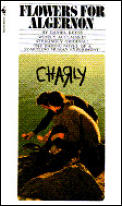
| Publisher: | Bantam |
| Copyright: | March 1966 |
| Printing: | July 1975 |
| ISBN: | 0-553-27450-3 |
| Format: | Mass market |
| Pages: | 216 |
This is the novel expansion of Flowers for Algernon, which won the Nebula Award in 1966. I'd read the original short story by the same name, some time ago. I actually like the expansion better, I think; it feels like there's more room to explore the characters, although it's been a long time since I've read the original.
This is one of the classics of science fiction, and has even sparked a fair amount of mainstream attention, so many people are already familiar with the basic plot. A mentally retarded man is the subject of a scientific experiment to increase his mental capacity and becomes a genius. Flowers for Algernon is written as his personal journal entries, starting before the experiment and leading the reader through it and what happens afterwards.
The journal technique is quite effective in bringing the reader into the story and conveying Charlie's intelligence level, using spelling and grammar as superficial clues and the sophistication of Charlie's observations as a deeper clue to his current intelligence level. Over the course of the book, the writing slowly becomes more sophisticated, in tune with the underlying thoughts. I liked the balance between first-person immediacy and thoughtful retrospective that the format of a journal entry at the end of each day or two provides.
While this is clearly speculative fiction, the point of Flowers for Algernon isn't the technology that lets Charlie become more intelligent but rather how people react to him, both before and afterwards, as his perceptions of the world change. This is, in part, a sharp rebuke of the way that the mentally retarded are treated, but there are also interesting explorations of identity, friendship, and the results of revisiting one's past. There are several wonderfully memorable characters, particularly the free-living artist living next door.
Parts of this book are a bit painful to read, particularly Charlie's attempts to come to terms with his sex life, and the pacing does suffer from the expansion from a short story in a few places. The story also isn't easy; human cruelty and failings are sharply portrayed. But this is a classic of science fiction for well-deserved reasons, even though there isn't much here in the way of science. The reader's growing ability to understand Charlie and Charlie's attempts to understand himself touch on the exploration of alienness and human reactions to it that underpin so many great science fiction stories. Highly recommended.
Reviewed: 2004-10-18